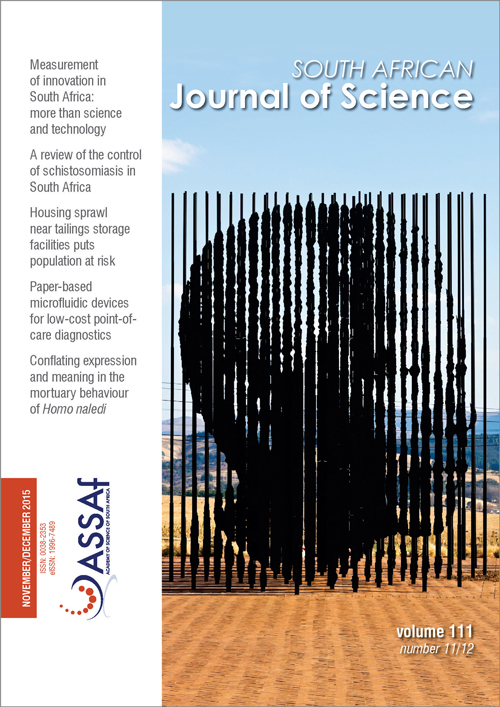Paper-based smart microfluidics for education and low-cost diagnostics
DOI:
https://doi.org/10.17159/sajs.2015/20140358Keywords:
diagnostics, printed electronics, biosensors, micro paper-based analytical devices, μPADAbstract
Current centralised healthcare models pose many challenges, particularly for developing countries such as South Africa, where travel and time costs make it difficult for patients to seek healthcare, even when urgently needed. To address this issue, point-of-care (PoC) tests, which are performed at or near the site of clinical care, have gained popularity and are actively being developed. Microfluidic systems, in which small volumes of fluids can be processed, provide an ideal platform on which to develop PoC diagnostic solutions. Specifically, the emerging field of paper-based microfluidics, with advantages such as low-cost, disposability and minimal external equipment requirements, provides unique opportunities for addressing healthcare issues in developing countries. This work explores the field of paper-based microfluidics, with step-by-step instructions on the design, manufacture and testing processes to realise paper-based devices towards diagnostic applications. Paper-based microfluidic and electronic components are presented, as well as the integration of these components to provide smart paper-based devices. This serves as an educational tool, enabling both beginners and experts in the field to fast-track development of unique paper-based solutions towards PoC diagnostics, with emphasis on the South African context, where both the need for and impact of these solutions are great.
Published
Issue
Section
License

All articles are published under a Creative Commons Attribution 4.0 International Licence
Copyright is retained by the authors. Readers are welcome to reproduce, share and adapt the content without permission provided the source is attributed.
Disclaimer: The publisher and editors accept no responsibility for statements made by the authors
How to Cite
- Abstract 727
- PDF 750
- EPUB 219
- XML 256












.png)